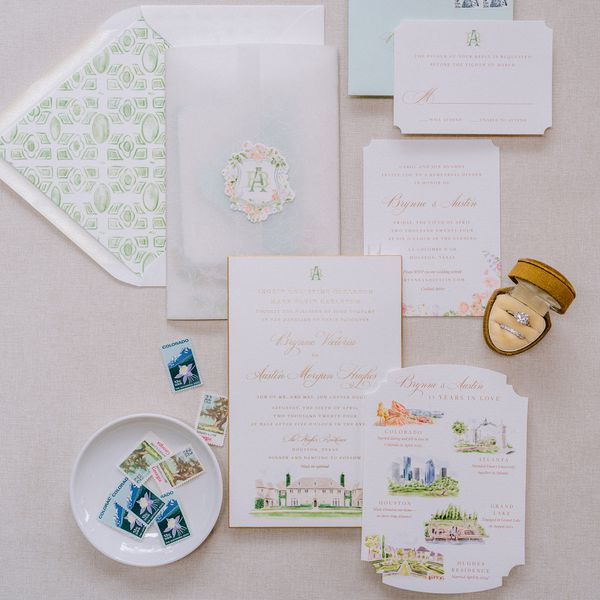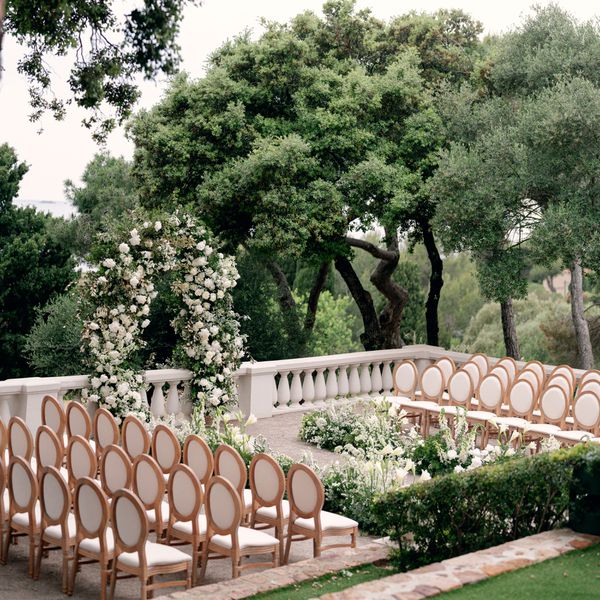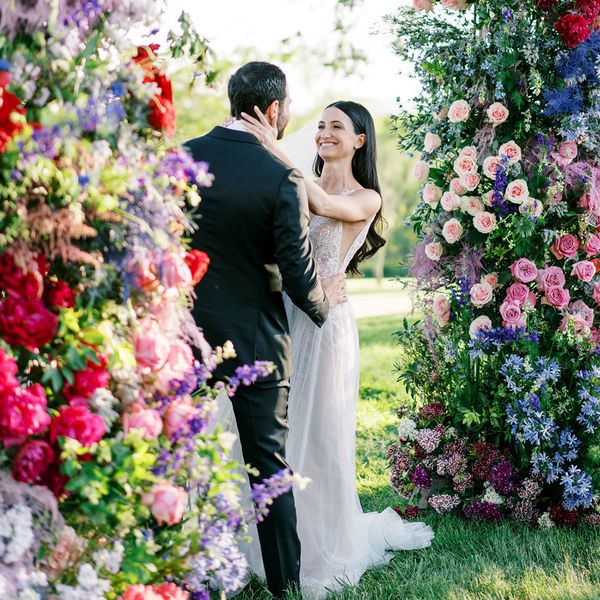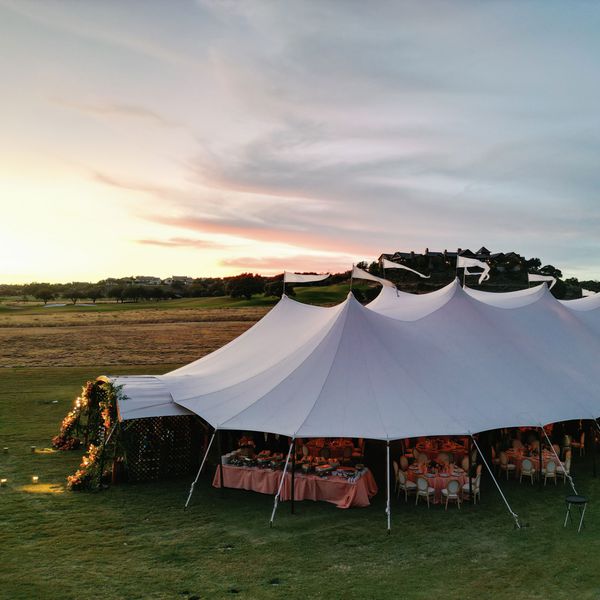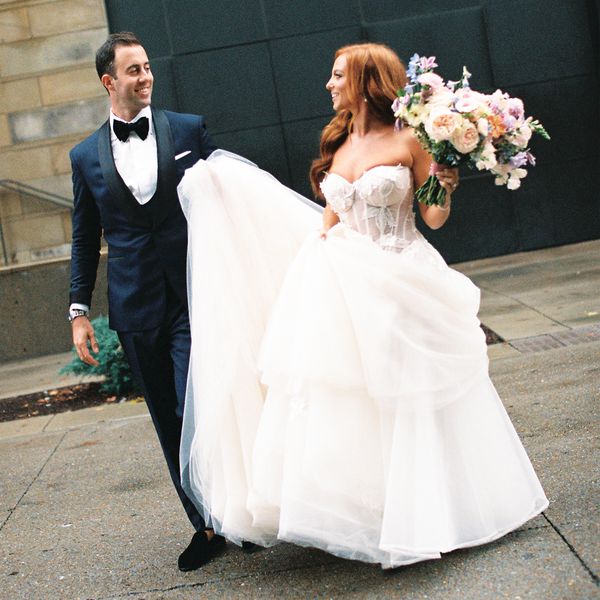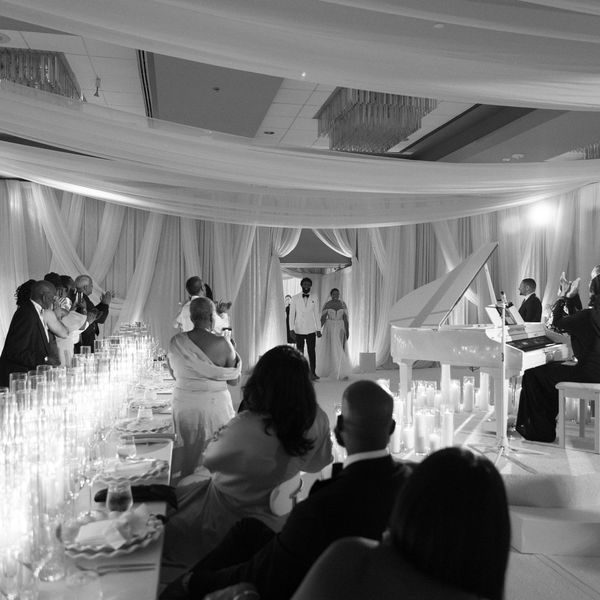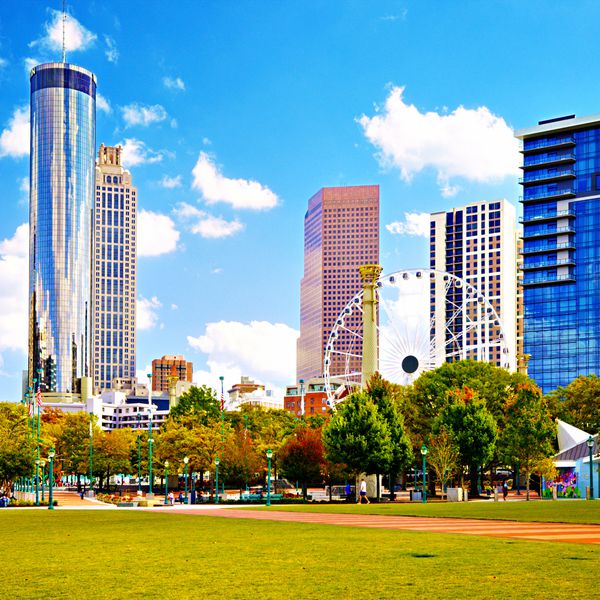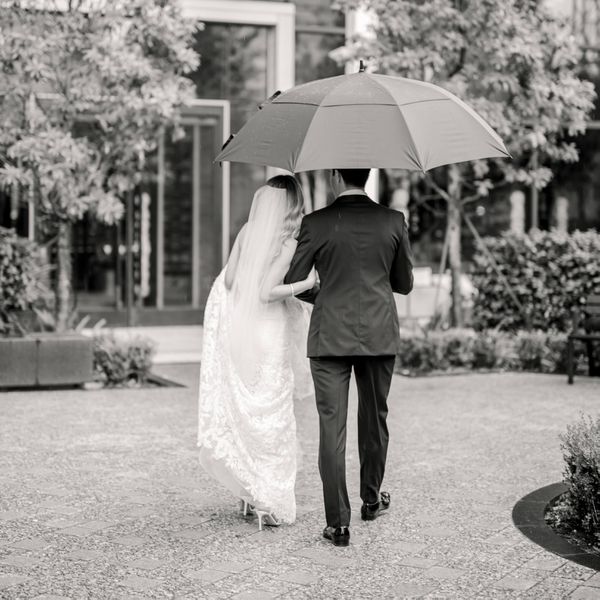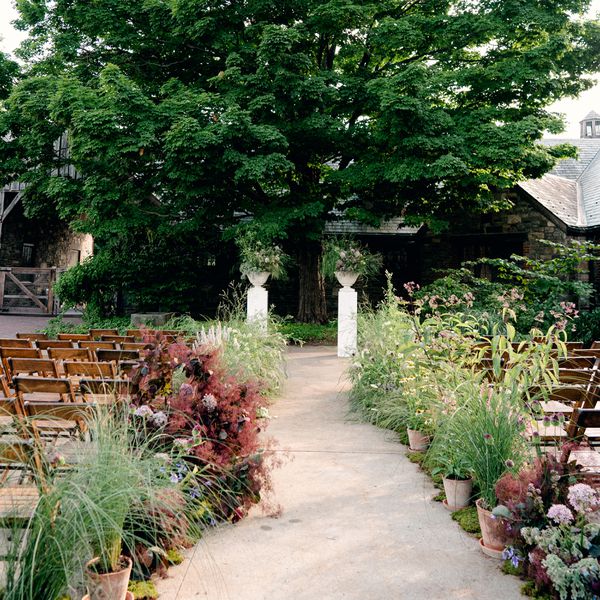:max_bytes(150000):strip_icc()/wedding-date-best-weather-outdoor-wedding-arch-garden-getty-recirc-0624-a6beaf3be9834dbf91cf6340a3f54a54.jpg)
Getty Images / Klaus Vedfelt
When it comes down to it, there are actually very few things that are outside of your control on your wedding day. You’ve carefully planned for virtually every contingency; your emergency kit is packed, you’ve made copies of your vows (just in case), and you’ve spent months (and months) meticulously crossing off every to-do to all but guarantee a stress-free celebration. The one item that is definitively out of your hands, though, is the weather, from heavy rain and veil-thieving winds to makeup-melting heat waves (or cold snaps!) and smoke from wildfires far away (we all remember the summer of 2023).
It’s a hard pill to swallow, since we all wish we had access to the sky’s on/off switch when those storm clouds roll in (let’s be real: rain on your wedding day may be lucky, but no one actually wishes for it). From the jump, we do the best we can to reduce the chances of bad big-day weather; in fact it’s one of the most important—if not the most important—factors to consider when choosing a wedding date, even if you’re planning an indoor ceremony. “For many, their wedding day is considered to be the ‘biggest day of their life’ and they want everything to be perfect, including the weather,” affirms Cheryl Nelson, a meteorologist and wedding coordinator.
Of course, it goes far beyond rain. Heat and humidity can ruin your hair, cause you to sweat through your suit or dress, or make an outdoor ceremony downright miserable for guests. Heavy winds can destroy the most beautiful outdoor reception, and unexpected snow and ice can make travel impossible. And while you can avoid hurricane season or try to choose a month where rain or other unfavorable conditions are unlikely in your region, is that really the best you can do? In this day and age, do we have access to any other data that can help us choose a wedding date with perfect weather? (Though it varies by person, Nelson’s idea of perfection is “sunny, 75 degrees, and low humidity.”)
Meet the Expert
- Cheryl Nelson is a meteorologist, wedding coordinator and founder of Prepare with Cher.
- Jennifer Allen is a wedding planner and founder of Just Elope, an elopement and pop-up wedding company.
- Andrew Leavitt is the founder and concierge event meteorologist at Ironic Reports.
Turns out, there are several ways to make a more informed wedding date decision so you can get the weather you want to the very best of your ability. Below, we asked several industry pros to share their best tips for choosing a wedding date that allows the clear, cloud-free sky to stand in as your something blue.
Tips for Choosing a Wedding Date With the Best Weather
You can't necessarily deliver a perfect day on a silver platter, but you can crunch the numbers and really get to know your wedding locale before you lock in a date. Here are our expert's best tips for selecting a date with the smallest chance of rain (or any other unfavorable weather pattern).
Do Historical Weather Research by Date
If you’re getting married close to home, you probably have a pretty good idea of the general weather patterns from month to month and day to day. If you’re considering a destination wedding—or even one just a few hours away—do your research to get a feel for the weather in that area. Nelson recommends the U.S. Climate Data website, where you can check out typical weather by state and city. “This is a good baseline. You can learn what months are typically wet versus dry and hot versus cold,” she explains. Don’t consider it your sole source of truth, however. “I caution you to take this as a grain of salt, as one wildfire, storm system, or pop-up thunderstorm at the wrong time can quickly alter your expectations for a picture-perfect day.”
Concierge event meteorologist Andrew Leavitt and his team use climatology, which incorporates the past 30 years of climate history, to help clients decide on a wedding location and date, and align on expected weather. “That’s the key word: expected,” he says. “It’s not about, ‘Will it rain at 3 p.m.?”, but more about, ‘Over the last seven days in this region, at this time of year, it [typically] rains five out of seven days.’” Armed with these insights, you can plan and budget for an indoor/outdoor flex space, a tent option, and shoe changes if it’s going to be muddy.
Get Acquainted With Typical Weather Patterns in Each Region
Obviously, weather differs from state to state and region to region; a beautiful day in Ohio could be miserable in Arizona. Brush up on what to expect in each zone, especially if you're getting married in a locale that you don't know well.
Northeast
In the Northeast, winter storms and nor’easters are common, “but [locals] tend to be used to these and have a better understanding of how to react,” says Leavitt. “From late fall through early spring, there is a high risk for heavy snowfall, dangerous ice, and strong winds. These conditions may not affect those who are local to the wedding, but each year, they pose a great challenge for those traveling by air.”
Nelson notes to avoid hurricane season in states that run up and down the Atlantic’s coast; it runs from June 1 to November 30. “Thanks to record warm water temperatures and transitioning to La Nina, this hurricane season is forecast to be extremely active,” she says. “The climatological peak of the Atlantic hurricane season is mid-September. Use caution if planning a wedding during this time, especially if you are in the south/Gulf Coast or East Coast areas.”
Southeast
Though Leavitt says the “combination of hurricanes, tornadoes, and thunderstorms” make the Southeast vulnerable to severe weather from spring to early fall, it’s also a “beautiful” time for weddings in that area due to the “coastal winds, beautiful summer foliage, and longer days.”
West Coast
Wildfire season in California occurs from June to October, but November to March can be the wettest season out west, says Nelson. “April or May is typically a beautiful time to have a wedding in California with the spring bloom. Just be aware of morning fog, especially along the coast.”
“The West Coast typically experiences severe weather during the winter months (December to February),” adds Leavitt. “Despite its generally mild climate, the coast is not immune to the impacts of severe winter storms, which can bring heavy rainfall, strong winds, and flooding to coastal areas.”
Pacific Northwest
Dreaming of a ceremony in the lush, moody Pacific Northwest? You may want to book your wedding between May and September. “Heavy rainfall and winter storms dominate [October through April] and flooding is a significant concern,” says Leavitt. “The region's climate is known for persistent rain and stormy conditions, making it particularly vulnerable to flooding during these months.”
Midwest
A portion of the Midwest is known as “Tornado Alley,” and tornadoes and severe thunderstorms are common in spring to early summer (April to June) and late summer to early fall (August to October), says Leavitt. Winter storms are also common from late fall through early spring, bringing heavy snowfall and blizzards.
Great Lakes Region
Even more localized, The Great Lakes region, particularly downwind areas like western New York and Michigan, experience lake-effect snow due to cold air passing over warmer waters. In the Great Lakes states, Nelson advises choosing a date in October. “Temperatures will be cooling down a bit, but still comfortable, and the fall foliage is unbelievable.”
Be Realistic About the Location
Obviously, you want to get married somewhere that is special to you, whether that’s your hometown, go-to vacation spot, or where you and your spouse-to-be currently reside. You can get what you want, but you have to be realistic about the location, your dream date, and what that combination could mean, weather-wise. “People will choose their wedding location based on a fond memory, and that tends to be vacation spots,” explains Leavitt. Don’t take the weather from that happy memory as an indicator of what it’s like all the time. “Your vacation may have been the most lucky vacation in the world.”
Leavitt and his team often research three different locations at a time to share with clients; this gives them an idea of weather variations. “Compare the data,” he advises. “Does it mean Charleston will be the same weather the last time you went on a random weekend in September, or is it actually peak hurricane season?”
Figure Out How Comfortable You Are With Risk
Despite the fact that she’s a meteorologist, Nelson did not have an outdoor wedding, recognizing that she’d be too fixated on the weather to fully enjoy the day. If you know you’ll react similarly, checking your phone app every two minutes, it might be a good idea to opt for an indoor wedding. After all, any outdoor wedding comes with risks, ones you need to mentally and financially prepare for. “I call it risk mitigation,” says Leavitt. “There are financial risks—a tent rental might be $30,000. And things like photography, while it might not sound like a crazy risk, if you have a partner in a suit who tends to sweat, your photographer is only as good as the sweat stains on the back of a suit.” Will your buttercream cake melt in the humidity, destroying your dreams of a picture-perfect cake? Will you fret over tablecloths going flying in the wind? Be honest with yourself.
Don’t let the pressures of beautiful outdoor events on social media fool you, adds Leavitt: “There’s no wind in an Instagram photo.That is a perfect still moment in time.” Ultimately, if you’re using “hanging lights or any décor pieces, doing drapes or tablecloths, and you’re not balancing them correctly or securing it down, with anything over 15 miles per hour wind, it will turn from someone describing the day as breezy to ‘It was a disaster,’” he adds.
:max_bytes(150000):strip_icc()/wedding-date-best-weather-getty-0624-c9d47900e4954f36aa66d25edfa51f22.jpg)
Getty Images / Thomas Barwick
How to Prepare for Unexpected Wedding Weather
You can do comb through the weather reports and select a date with historical data that points to clear skies and sunshine—and you still might get it wrong. Here's how to prepare for those unexpected wedding weather blips, from a sudden rain shower to high winds. Remember: Forming a plan now will give you peace of mind later on.
Always Have a Backup Plan
Sure, you can use years of historical weather data to make an informed wedding date decision—and you still might get it wrong. You’ll need to prepare for that outcome. “Rent that tent. Rent the outdoor heaters. Have an option to move the ceremony to an indoor location if available,” says Nelson. If you have your heart set on an outdoor celebration, you must have a plan B in place, just in case.
Ultimately, that plan B might not be drastic—you just might have to be flexible with your day-of timeline. Don’t be afraid to push back the ceremony for a short amount of time to let a brief rainstorm pass, for example. “As a day-of wedding coordinator and meteorologist, I've tracked thunderstorms on radar on wedding days and advised couples to delay ceremonies by 30 minutes to avoid the risk of lightning and/or soaking your guests,” Nelson shares.
One of the most important players in your backup plan is your venue, so make sure they’re prepared for any sudden weather shifts before you book; the property’s team should be able to quickly pivot if needed. “If the weather is a true concern, book a wedding venue that has an indoor backup option or a chic weather-proof tent that will keep the celebration going, no matter what surprises Mother Nature has in store!” advises wedding planner Jennifer Allen.
Don’t Fixate or Rely on a Weather App
Resist the urge to open up Apple Weather and crumble when you see a little rain symbol on your wedding date. “Don’t check your weather app a week out!” says Leavitt. “Most apps use historical weather data. Those are good for expectations, not exact timing.” If you see an 80 percent chance of rain, don’t flip. “The 80 percent chance of rain is an 80 percent chance we’re going to get a [small amount] of rain at 2 a.m.,” posits Leavitt. Take the next steps to figure out the when and how much before you start panicking.
Prioritize Guest Comfort No Matter What
You’re not the only one at your wedding! Consider your guests’ comfort when choosing your wedding date and adapt your plans as needed. If it’s going to be hot to the max, provide fans, sunscreen, and sunglasses. If it’ll cool off dramatically at night, Nelson suggests providing outdoor heaters and fire pits. Leavitt adds that many companies now provide umbrella and pashmina rentals for rain or sudden chills. Get creative, and you can have your dream wedding no matter the weather.
The same goes for guest travel. “If a lot of people will be traveling a great distance to your wedding, choose a location close to a major airport, and a date that climatologically has quieter weather, to avoid guests being unable to attend due to canceled flights or treacherous roads from snow or ice,” says Nelson. Leavitt adds that while some people are perfectly comfortable driving in snow, other guests and vendors may not be. Do you have a plan to get them to the venue safely if there’s a snowstorm?
Accept Mother Nature for Who She Is
“The only time the weather will be an issue is if you choose to make it a fight,” says Leavitt. “You need to really self-reflect and say, ‘I do not have control. This is the reality and we’re going to move forward with it.’” According to Leavitt, he’s worked at weddings with “horrible weather,” and while bad weather is a bummer, it doesn’t have to ruin the celebration—or your new life together. “We’ve never had a client say it ruined their marriage.”
